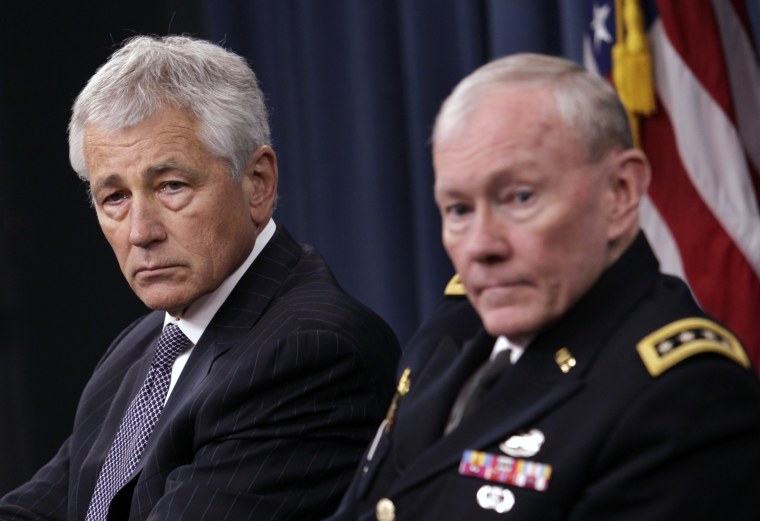Last week, Sen. Lindsey Graham (R-S.C.)
complained bitterly and publicly about the Obama administration for not "addressing the threat" posed by ISIS. Graham's expectations were clear: he wanted more rhetoric, sooner rather than later.
In theory, the senator has less to complain about this week. In the wake of James Foley's murder, President Obama issued a
sweeping condemnation of ISIS,
as did Secretary of State John Kerry. Yesterday, Defense Secretary Chuck Hagel
characterized the terrorist group as "beyond anything we have seen."
In a joint briefing at the Pentagon a day after officials revealed the U.S. secretly launched a failed mission to rescue Foley and other kidnapped Americans held by the Islamic State and Syria and Iraq (ISIS), Hagel suggested the terror group poses a "9/11-level" threat to America. "ISIL is as sophisticated and well-funded as any group we have seen. They are beyond just a terrorist group," Hagel said. "They marry ideology, a sophistication of strategic and tactical military prowess, they are tremendously well funded. This is beyond anything we have seen."
During the same briefing, General Martin Dempsey, the Obama-appointed chairman of the Joint Chiefs of Staff, added, "This is an organization that has an apocalyptic end-of-days strategic vision that will eventually have to be defeated.... Can they be defeated without addressing that part of the organization that resides in Syria? The answer is no."
The assessments came against the backdrop of additional airstrikes against ISIS in northern Iraq. All told, there have been
90 U.S. airstrikes against the terrorist group over the last two weeks.
As for the politics surrounding the national-security strategy, the line from the president's critics has not yet come into focus. We know they're not satisfied; we don't know what they'd do differently.
At this point, White House detractors -- primarily but not exclusively on the right -- have two main areas of criticism. The first complaint is that the president is golfing during his vacation -- a mind-numbing objection that has somehow become
literal front-page news -- while the second is that the administration should do more to fight ISIS.
More what? As Mark Landler
noted, no one seems entirely sure.
A growing number of Republicans are criticizing Mr. Obama for not doing more.... Representative Mike Pompeo, a Kansas Republican who is also a member of the House Permanent Select Committee on Intelligence, said: "The president's current path of action has been far too limited to make a difference. We must do what is necessary to eliminate ISIS, protect the innocent, and keep Americans safe." But few of these Republicans have laid out exactly what they want Mr. Obama to do to intensify the battle.
At the same time, of course, there are forceful progressive voices, mindful of recent history, urging caution. Again from Landler's
report:
"Most Democrats and Republicans are extraordinarily wary of being sucked into a large occupation, both because it will kill a lot of Americans and because we saw in Iraq the last time that it didn't work," said Representative Adam B. Schiff, Democrat of California and a member of the House Permanent Select Committee on Intelligence. [...] "This horrendous event has got a lot of folks in Congress talking," Representative Peter Welch, a Vermont Democrat, said of the killing of Mr. Foley, "but it doesn't give us a license to ignore the lessons of George W. Bush in Iraq."
